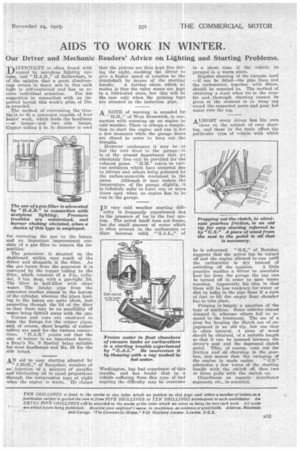AIDS TO WORK IN WINTER.
Page 35

If you've noticed an error in this article please click here to report it so we can fix it.
Our Driver and Mechanic Readers' Advice on Lighting and Starting Problems.
TA IFFICULTY is often found with 1./ regard to acetylene lighting systems, and " H.A.l3.," of Rotherham, is of the opinion that a great disadvantage occurs in many sets in that each light is self-contained and has to re ceive individual attention. For his suggestion in connection with an improved layout this week's prize of 155. is awarded.
The method of overcoming the trouble is to fit a generator capable of four hours' work, which feeds the headlamp —or lamps—and two side lamps. Copper. tubing in. in diameter is used
for conveying the gas to the lamps, and an important improvement consists of a gas filter to remove the impurities.
The generator is situated on the dashboard within easy reach of the driver and alongside is thea filter. As the gas issues from the generator it is conveyed by the copper tubing to the filter, which consists of a 3-in. cylinder, 3 ins, deep, with a gas-tight lid. The filter is half-filled with clean water. The intake pipe from the generator reaches almost to the bottom of the cylinder, whereas the pipes leading to the lamps are quite short, just projecting through the lid of the filter so that there may be no possibility of water being i'afrie'd away with the gas.
Unions and nuts are employed to form the fixings for the capper pipes, and, of course, short lengths of rubber tubing are used for the various connections. " H.A.B." points out that the size of burner is an important factor, a Bray's No. 5 Special being suitable for most headlamps and No. 10 for the side lamps.
AN aid to easy starting adopted by " J.McM.," of Sanquhar, consists of an injection of a mixture of paraffin and lubricating oil in equal proportions through the compression taps at night when the engine is warm. He claims
that the pistons are thus kept free during the night, enabling the driver to give a higher spe.ed of rotation to the crankshaft by means of the starling handle. A further claim which he makes is that the valve stems are kept in a lubricated state, but this will be the ease only when the priming taps are situated in the induction pipe.
A. NOTE of warning is sounded by " H.M.," of West Bromwich, in connection with warming up an engine in cold weather. There is always a temptation to start the engine and run it for a few moments while the garage doors are closed in. order to keep out the draught.
However unpleasant it may be to feel the cold wind in the garage—it is of the utmost importance that an absolutely free exit be provided for the exhaust gases. " H.M." refers to various accidents which have occurred due to drivers and others being poisoned by the carbon-monoxide contained in the gases. Although it may reduce the temperature of the garage slightly, it is infinitely safer to leave one or more doors open when an engine has to be run in the garage.
IN very cold weather starting diffi
culty is frequently experienced due to the presence of ice in the fuel system. The petrol itself does not freeze, but the small amount of water which is often present in the carburetter or filter becomes solid. " G.A.L.," of
Washington, has had experience of this trouble, and has fOund that in a vehicle suffering from this type of bad starting the difficulty may be overcome in a short time if the vehicle be garaged in a warm place.
Regular cleaning of the vacuum tank —if one be fitted—the pipe lines and the carburetter, together with filters, should be resorted to. The method of obtaining a start when ice is the trouble and thorough cleaning cannot be given at the moment is to wrap rag round the suspected parts and pour hot water over the rag.
ALMOST every driver has his own ideas on the subject of easy starting, and these in the main affect the particular type of vehicle with which he is cohcerned. " G.S.," of Burnley, suggests that the petrol tap be turned off and the engine allowed to run until the carburetter is dry instead of
switching off the ignition. A little practice enables a driver to ascertain how far from the garage the tap can be turned off in order to save waste running. Apparently his idea is that there will be less tendency for water or dirt to lodge in the pipe lines if a rush of fuel to Jill the empty float chamber has to take place.
Priming is largely a question of the type of machine. Some vehicles almost demand it, whereas others fail to respond to the treatment. The use of a prop for keeping the clutch out of engagement is an old tip, but one that is often ignored. A piece of wood should be obtained, of a suitable length so that it can be jammed between the driver's seat and the depressed clutch • pedal. This, of Course, cuts Out the friction and oil churning in the gearbox, and means that the swinging of
the engine is made easier; " G.S." advocates a few turns of the starting handle with the switch off, then two or three pulls with the switch on:
Cleanliness as regards distributor segments, etc., is essential.




































